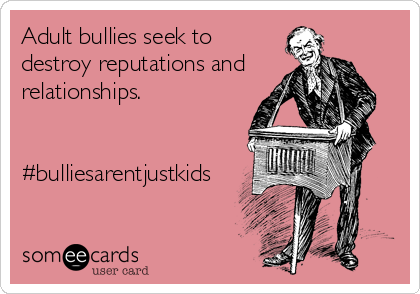It’s a sad reality that bullying does not end when you leave school-age. Indeed, the depravity of our world is often displayed by how extensively bullying behaviour prevails in our workplaces and – yes- even our churches. This post is not an effort to try to explain why bullying takes place, as it’s not so complicated. I would argue that bullying is always the result of two things:
- The general fall – all of creation, men creature and land are affected by the fall and will sin, until the next age to come. (a pessimistic outlook.
- Personal circumstance – I find it hard to believe that people are bullies for no reason. I suspect that their upbringing, self-worth, and circumstantial issues have left them mean and ragged. (my, perhaps too much so, optimistic outlook)
How can you identify a bully? I think it is quite simple – and it often marked by a ‘chronic’ attitude, rather than occasional irritation
- Someone who is rude, taunting, mean to you directly, especially if their behaviour is disproportionate to your own behaviour towards them. (Of course, if they are behaving unusually cold towards you, it might be best to approach them privately and try to work out if something has offended them!)Indeed, a good way to determine if this is a ‘bully’ situation is by their approachability. A bully won’t care whether what they said was hurtful or mean, and is unlikely to apologise (not genuinely).
- A gossip. As a disclaimer I should note that I have always thought ‘gossip’ was a nebulous term. Surely it will be expected that we will talk about people – and when we are frustrated I think it is expected that this discourse might occasionally be an irritable manner. However, I think a ‘chronic gossip’ (i.e., bully) can be easily identified by two factors:
- Someone who unceasingly has negative things to say about people in your private conversations.
- Someone who feels the urge to post gory details of a private matter on social media, talking loudly in front of other people about this person, and /or any other public display of ‘tearing someone down’. It is simply uncalled for. It’s bullying, simple as that.
Finally, I expect most of us have fallen victim to this type of behaviour – sadly, even in church settings. You might find it especially prevalent at small group, bible studies, or membership meetings. Sadly, these occasions can often be used as an excuse to degrade others. Here are a few things to remember if you are dealing with this type of behaviour:
- It’s not you. Even if you have done something to upset the bully, you might notice their response seems excessive considering the issue at hand. You might notice they are tearing you down instead of addressing the issue pragmatically. While you ‘may’ have done something to catalyse their irritation, you’re not the reason they are the way they are. Therefore, ‘try’ not to take it personally (easier said than done).
- Feel free to grieve. Take some time to react to what has happened – this may mean finding a quiet place to cry, punch a pillow, write in a journal, etc… it’s okay to feel hurt, and it’s okay to express this.
- Share. Share how you are feeling with someone. If this is a repeated issue at work or at church – share it with someone. If you feel like you cannot share it with anyone at work or church due to circumstances then – first, it may be time to high-tail it out of that place; and second, share with an external confidante. (Just don’t rant in detail about the person on Facebook, YouTube, etc).
- Pray. In supplication and thanksgiving. Pray for the bully – that they would be corrected, convicted, and repent of their awful ways. And secondly, in thanksgiving – that God is no bully. That he created you, loves you, sent his Son for you, and will never leave you nor forsake you. All people will, at some point, be a let-down. God’s promises, on the other hand, are unbreakable.
- Remember. Remember how this felt. Next time you’re feeling irritated or angry with someone, be mindful as to how you treat them – whether they deserve it or not. A grace-filled stern correction goes much farther than an enraged or sarcastic explosion.

